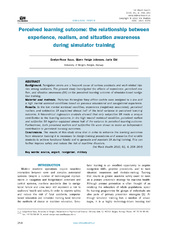| dc.contributor.author | Saus, Evelyn-Rose | |
| dc.contributor.author | Johnsen, Bjørn Helge | |
| dc.contributor.author | Eid, Jarle | |
| dc.date.accessioned | 2016-08-05T08:13:18Z | |
| dc.date.available | 2016-08-05T08:13:18Z | |
| dc.date.issued | 2010 | |
| dc.identifier | https://journals.viamedica.pl/international_maritime_health/article/view/26215 | |
| dc.Published | International Maritime Health 2010, 61(4):258-264 | eng |
| dc.identifier.issn | 2081-3252 | |
| dc.identifier.uri | https://hdl.handle.net/1956/12462 | |
| dc.description.abstract | Background. Navigation errors are a frequent cause of serious accidents and work-related injuries among seafarers. The present study investigated the effects of experience, perceived realism, and situation awareness (SA) on the perceived learning outcome of simulator-based navigation training. Material and methods. Thirty-two Norwegian Navy officer cadets were assigned to a low and a high mental workload conditions based on previous educational and navigational experience. Results. In the low mental workload condition, experience (negatively associated), perceived realism, and subjective SA explained almost half of the total variance in perceived learning outcome. A hierarchical regression analysis showed that only subjective SA made a unique contribution to the learning outcome. In the high mental workload condition, perceived realism and subjective SA together explained almost half of the variance in perceived learning outcome. Furthermore, both perceived realism and subjective SA were shown to make an independent contribution to perceived learning outcomes. Conclusions. The results of this study show that in order to enhance the learning outcomes from simulator training it is necessary to design training procedures and scenarios that enable students to achieve functional fidelity and to generate and maintain SA during training. This can further improve safety and reduce the risk of maritime disasters. | en_US |
| dc.language.iso | eng | eng |
| dc.publisher | Via Medica | eng |
| dc.rights | Attribution CC BY-NC-ND | eng |
| dc.rights.uri | http://creativecommons.org/licenses/by-nc-nd/4.0/ | eng |
| dc.subject | novice | eng |
| dc.subject | expert | eng |
| dc.subject | navigation | eng |
| dc.subject | military | eng |
| dc.title | Perceived learning outcome: the relationship between experience, realism, and situation awareness during simulator training | eng |
| dc.type | Peer reviewed | |
| dc.type | Journal article | |
| dc.date.updated | 2016-04-08T08:45:51Z | |
| dc.description.version | publishedVersion | |
| dc.rights.holder | Copyright 2010 Via Medica | eng |
| dc.identifier.cristin | 538424 | |
| dc.subject.nsi | VDP::Samfunnsvitenskap: 200::Psykologi: 260::Sosial- og arbeidspsykologi: 263 | |
| dc.subject.nsi | VDP::Social sciences: 200::Psychology: 260::Social and occupational psychology: 263 | |

